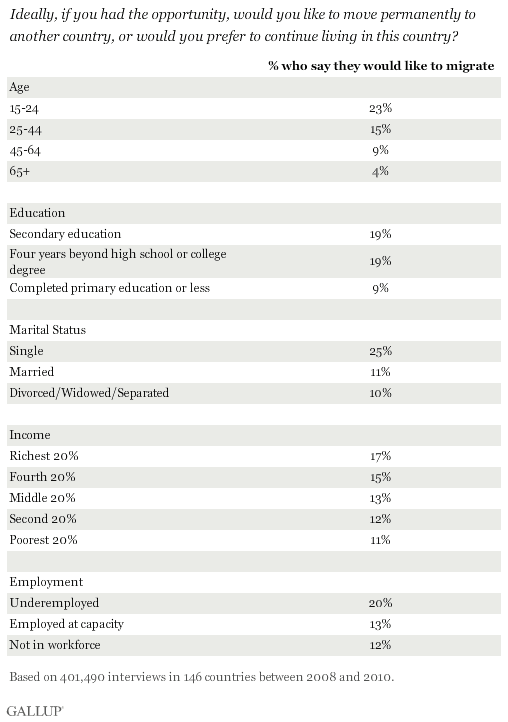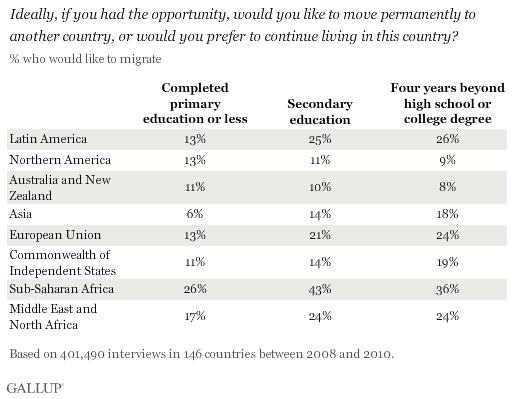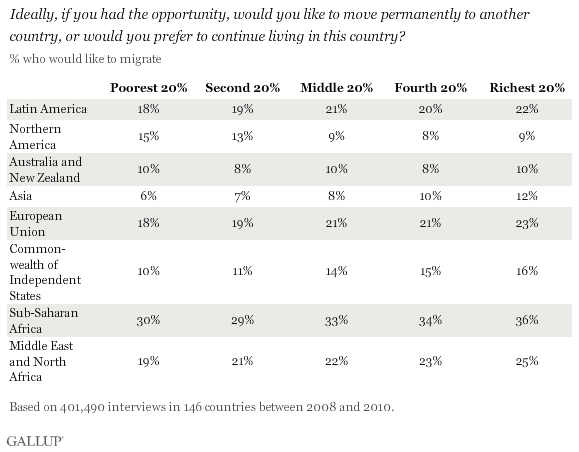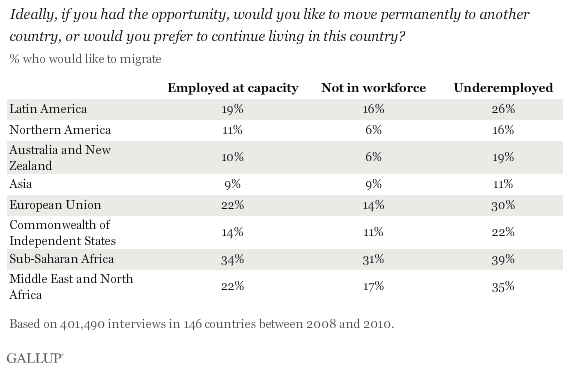WASHINGTON, D.C. -- Gallup finds that the world's roughly 630 million would-be migrants are most likely to be young, single, educated, and relatively financially well-off. But they are also most likely to be underemployed and may feel they need to move to another country.

Gallup's latest findings on adults' desire to move to other countries are based on a rolling average of interviews with 401,490 adults in 146 countries between 2008 and 2010. The 146 countries represent more than 93% of the world's adult population.
Young People Want to Move Away
People's desire to migrate is strongly related to their age. Moving to another country permanently is a common dream among young people, with more than one in five 15- to 24-year-olds worldwide saying they would like to migrate if they had the chance. This desire declines sharply after age 25, about the time that many people start to put down firmer roots. By age 65, this desire dwindles to 4%.
With respect to roots, single adults (25%) are more than twice as likely as those who are married (11%) to say they would like to move to another country permanently if they had the chance. Age explains some of this, but even among the youngest adults (15 to 24), those who are married are less likely to say they would like to move.
More Educated More Likely to Want to Move
Potential migrants also tend to be better educated. They are more likely to have secondary or higher education, with about one in five in each of these two categories saying they would like to move to another country. This is not the pattern everywhere, however. In Northern America, those with an elementary education or less are more likely than their more educated counterparts to want to move.

Desire Gap Between Richest and Poorest
People who are more likely to have the means to move are more likely to desire to leave their countries for good. The desire to migrate rises with income, with people in the richest 20% income quintile of their countries the most likely to want to move. This pattern is evident in most regions, but again, Northern America stands out because the poorest income group is the most likely to want to leave.

Underemployed Often Most Likely to Want to Move
Adults who are unemployed or employed part time but want to work full time -- whom Gallup classifies as "underemployed" -- are nearly twice as likely to want to move as people who are employed at capacity or not in the workforce at all. People who are employed full time for an employer, self-employed full time, or employed part time and do not want to work full time are considered employed at capacity. Across the world, the underemployed are more likely to want to move, although this is true to a lesser extent in Asia and sub-Saharan Africa.

Implications
Gallup finds that worldwide people's desire to migrate permanently to another country is showing signs of cooling, but the hundreds of millions of adults who would still like move, where they would like to go, and who they are have substantial implications for labor forces in countries that send or receive migrants. The strong relationship between people's desire to migrate and their age and education reinforces how important it is to study what pushes or pulls these potential migrants before their desires become real brain drain or brain gain.
Survey Methods
Results are based on aggregated telephone and face-to-face interviews with 401,490 adults, aged 15 and older, in 146 countries from 2008 to 2010. The 146 countries surveyed represent 93% of the world's adult population. One can say with 95% confidence that the margin of sampling error for the entire sample accounting for weighting and sample design is less than ±1 percentage point.
For complete methodology and specific survey dates, please review Gallup's Country Data Set details.
Learn more about how the Gallup World Poll works.
